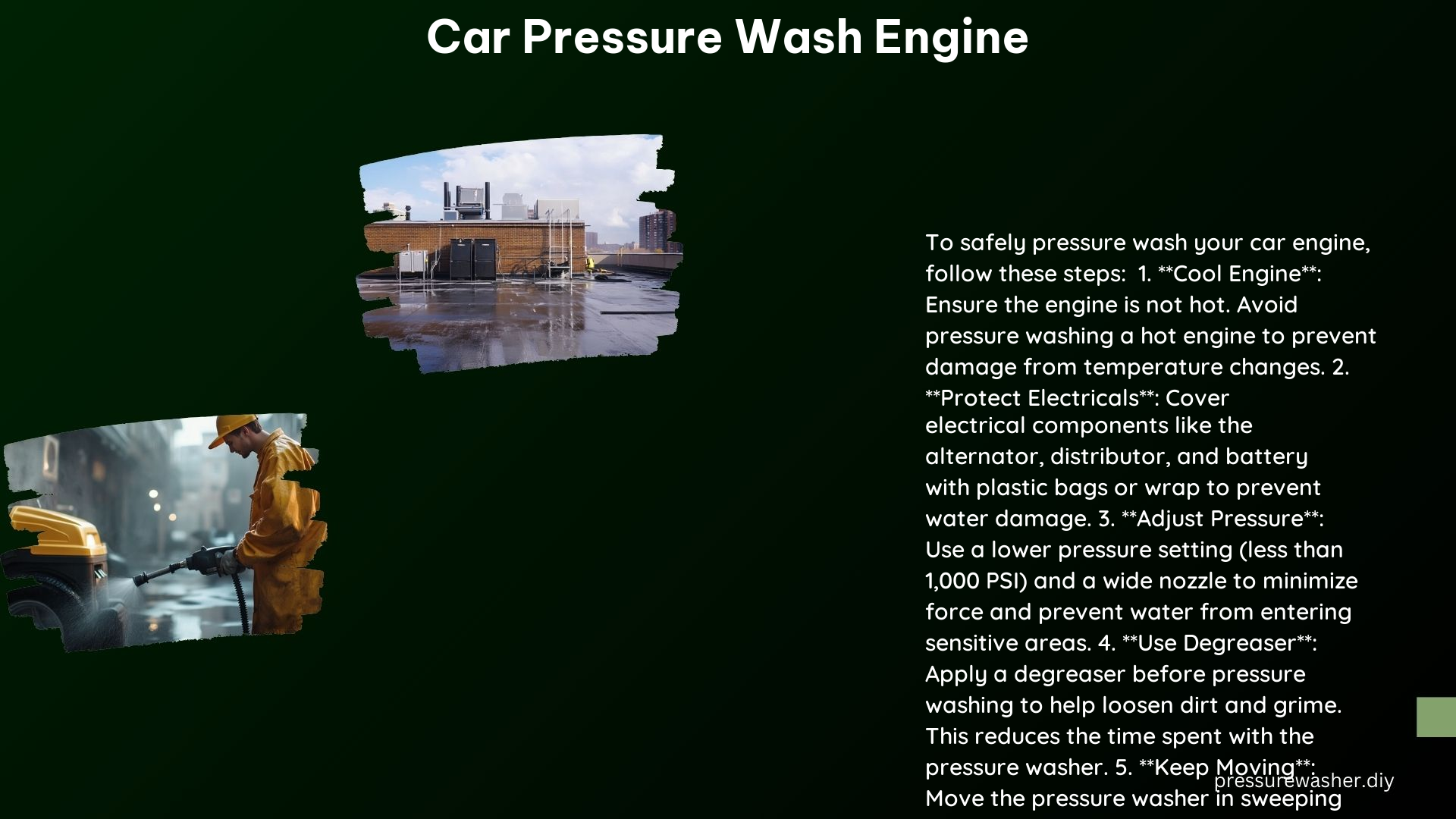Pressure washing your car’s engine can be a highly effective way to remove stubborn dirt, grime, and built-up debris, but it requires careful consideration and proper techniques to avoid potential damage to sensitive components. This comprehensive guide will walk you through the essential steps and precautions to ensure a safe and successful engine pressure wash.
Precautions and Preparation
Cool the Engine
Before you begin, it’s crucial to ensure that the engine is completely cool. Pressure washing a hot engine can lead to thermal shock, which can cause damage to seals, gaskets, and other delicate components. Allow the engine to cool down for at least 30 minutes after the vehicle has been driven to avoid this issue.
Protect Electrical Components
Electrical components, such as the alternator, distributor, and battery, are highly susceptible to water damage. To prevent this, cover these sensitive areas with plastic wrap or sealable bags, ensuring a tight seal to keep water out.
Disconnect the Battery
As an added precaution, disconnect the negative battery terminal to eliminate the risk of short circuits during the pressure washing process. This step is particularly important if you plan to use a high-pressure washer.
Use a Degreaser
Applying a degreaser to the engine before pressure washing can help loosen and break down stubborn dirt and grime. This can reduce the risk of pushing water into sensitive areas, as the degreaser will help lift and remove the contaminants more effectively.
Pressure Washing Techniques

Adjust the Pressure
When pressure washing your engine, it’s essential to use a lower pressure setting (typically around 1,000-1,500 PSI) and a wider nozzle. This will minimize the force of the water and prevent damage to seals, gaskets, and electrical components.
Keep the Nozzle Moving
Continuously move the pressure washer nozzle in sweeping motions to avoid focusing high-pressure jets on any one area for too long. This will help distribute the water evenly and reduce the risk of water intrusion.
Maintain a Safe Distance
Keep the pressure washer nozzle at a safe distance from the engine, typically around 6-12 inches. This will prevent excessive water pressure from directly impacting sensitive components and causing damage.
Additional Tips
Use a Garden Hose
For a gentler cleaning approach, consider using a garden hose instead of a pressure washer, especially for older vehicles or engines with sensitive components.
Try Steam Cleaning
Steam cleaning can be an eco-friendly alternative to pressure washing, as it uses less water and can be more effective at breaking down stubborn dirt and grime.
Dry the Engine
After pressure washing, use microfiber towels or an air blower to thoroughly dry the engine and prevent water spots from forming.
Safety Considerations
Avoid Direct Pressure
Refrain from directing high-pressure jets directly at electrical components, seals, or gaskets, as this can lead to damage and potential malfunctions.
Watch for Corrosion
Be cautious when pressure washing older vehicles or engines without adequate anti-corrosion treatments, as the frequent exposure to water can accelerate the corrosion process.
By following these guidelines and taking the necessary precautions, you can safely and effectively pressure wash your car’s engine, ensuring a clean and well-maintained powertrain.
References:
- EricTheCarGuy. (2017, May 12). How To Wash Your Engine. YouTube. https://www.youtube.com/watch?v=3JXxCGUZVYw
- DetailXperts. (n.d.). Pressure Washing Your Car Engine: 7 Tips for Best Results. Retrieved from https://detailxperts.com/pressure-washing-your-car-engine/
- Reddit. (2021, September 17). Washing an engine bay? Is it safe long term? Retrieved from https://www.reddit.com/r/cars/comments/ppy26j/washing_an_engine_bay_is_it_safe_long_term/
- Giraffe Tools. (2022, April 29). Is It Safe to Pressure Wash your Engine? Retrieved from https://giraffetools.com/blogs/news/is-it-safe-to-pressure-wash-your-engine
- Reddit. (2023, September 24). How safe would it be to power wash the engine bay? Retrieved from https://www.reddit.com/r/MechanicAdvice/comments/16r5yoe/how_safe_would_it_be_to_power_wash_the_engine_bay/
